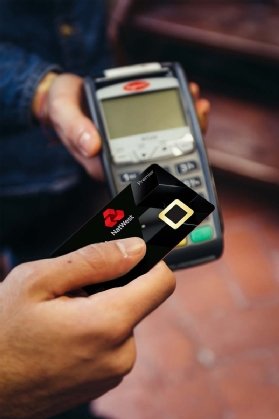
Davizro Photography - stock.adob
NatWest launches biometric card pilot
NatWest Bank is set to trial biometrics-based cards with 200 customers to verify contactless payment transactions over £30
NatWest is about to start a trial of payment cards equipped with biometric technology to increase security for contactless payments above £30.
The three-month pilot of the biometric cards, which were developed by the bank in partnership with Gemalto, Visa and Mastercard, will start in April.
Some 200 customers will use the new cards, and according to the bank, a range of different customer profiles were chosen for the trial, rather than age-specific, tech-savvy individuals.
On receiving the new cards, customers will be able to store and activate fingerprint-based verification themselves. Once the feature is active, if the customer places their finger on the card corner where their biometric information is stored, contactless payments above £30 will be authorised without the need to enter their PIN.
If the trial is successful, there is no official timeframe as to when the bank might be able to provide its 16 million customers with the biometrics-equipped cards, a NatWest spokesman said.
The payments industry is “a long way off” fully incorporating such cards, the spokesman added, but the bank hopes to get more insight into the usefulness and uptake of the feature from the trial.
“We are using the very latest technology across our business to make banking easier for our customers, and biometric fingerprint cards are one of the many technologies we are exploring further,” NatWest’s head of effortless payments, David Crawford, said about the trial.

“This is the biggest development in card technology in recent years and we are excited to trial the service,” he added.
NatWest’s pilot is the latest example of how organisations are seeking to find a balance between strong security and a good user experience, said Raj Samani, fellow and chief scientist at McAfee.
Samani argued that many organisations beyond the financial services sector would be considering how to implement biometric technology to improve cyber security for users, but it was not enough on its own.
“While [biometrics] can provide a useful additional barrier to keep cyber criminals at bay when used in conjunction with other security measures, [that technology] alone is not sufficient. A system’s security is only as strong as its weakest link,” the specialist warned.
When it comes to payment innovations, contactless is overtaking Chip and PIN as the most popular way of paying for goods and services. According to figures from payment processing firm Worldpay, the method was more popular than Chip and PIN in the UK in the year to June 2018, with 52% of goods and services being paid for through “tap and go” technology.
But fraud perpetrated using the method is also on the rise. According to figures by Action Fraud, fraudsters stole a total of £1.18m from contactless users in 2018, compared with £711,000 in 2017.
UK Finance, a body representing hundreds of banks, expects 36% of all payments in the UK to be contactless by 2027. The association estimates the method accounts for about 3% of all card fraud.
Read more about contactless pay
- Despite the popularity of contactless payments ahead of cash, Britons are worried about the security of tap and go.
- Russian banks have introduced their first contactless ATMs, which customers can link to via smartphones and wearable devices.
- UK Finance plays down fraud threat through contactless card skimming.








